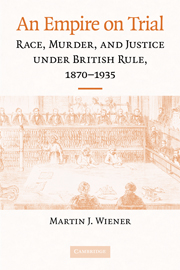Book contents
- Frontmatter
- Contents
- Preface
- Acknowledgments
- AN EMPIRE ON TRIAL
- Introduction
- 1 On the High Seas
- 2 Queensland, 1869–1889
- 3 Fiji, 1875–1885
- 4 Trinidad and the Bahamas, 1886–1897
- 5 India: The Setting
- 6 India: In the Legal Arena, 1889–1922
- 7 Kenya, 1905–1934
- 8 British Honduras, 1934
- Conclusion
- Bibliography
- Index
7 - Kenya, 1905–1934
Published online by Cambridge University Press: 05 June 2012
- Frontmatter
- Contents
- Preface
- Acknowledgments
- AN EMPIRE ON TRIAL
- Introduction
- 1 On the High Seas
- 2 Queensland, 1869–1889
- 3 Fiji, 1875–1885
- 4 Trinidad and the Bahamas, 1886–1897
- 5 India: The Setting
- 6 India: In the Legal Arena, 1889–1922
- 7 Kenya, 1905–1934
- 8 British Honduras, 1934
- Conclusion
- Bibliography
- Index
Summary
It will be an ill day for these native races when their fortunes are removed from the impartial and august administration of the Crown and abandoned to the fierce self-interest of a small white population.
Winston Churchill, My African Journey (1908)On a June day in 1923, a substantial Kenya farmer, Jasper Abraham, son of the Bishop of Norwich, ordered an African employee named Kitosh to deliver to the farm a horse that had been left at a railway station. When Abraham was told that the employee had been seen riding the horse, rather than walking it as he had been told to do, he flew into a tirade, demanding over and over again to know why the “boy” had defied his instructions and ridden it. The African finally replied that he was not a thief. Taken aback by this “insolent” answer, Abraham flogged him with an ox rein for fifteen minutes, then, tiring, ordered other African employees to continue the flogging, finishing off after a few more minutes by personally delivering a kick to the head. He then had him tied to a post in the storeroom for the night. By morning the man was dead. He died, as Dane Kennedy has astutely observed, “because he had ridden the European's horse.”
- Type
- Chapter
- Information
- An Empire on TrialRace, Murder, and Justice under British Rule, 1870–1935, pp. 193 - 221Publisher: Cambridge University PressPrint publication year: 2008

